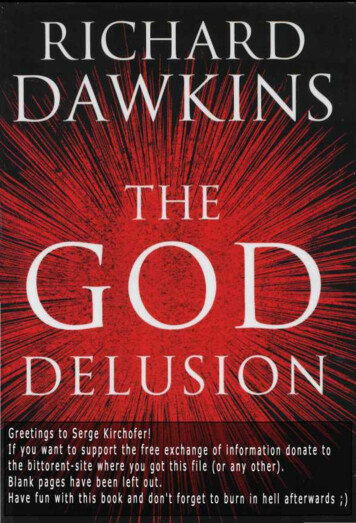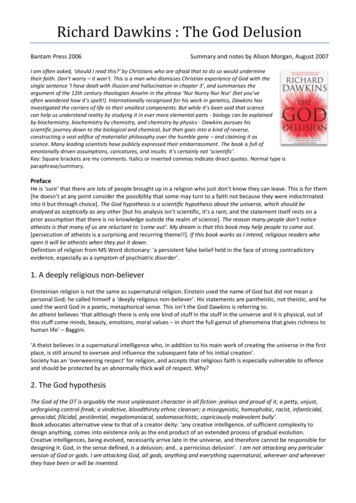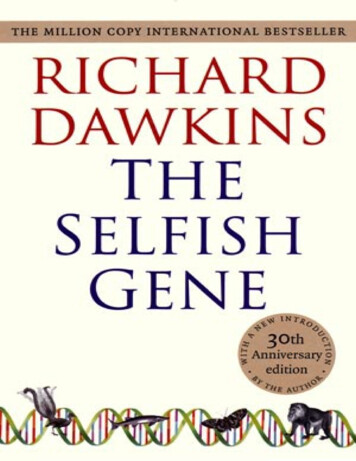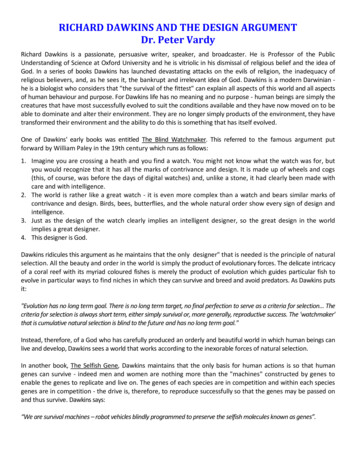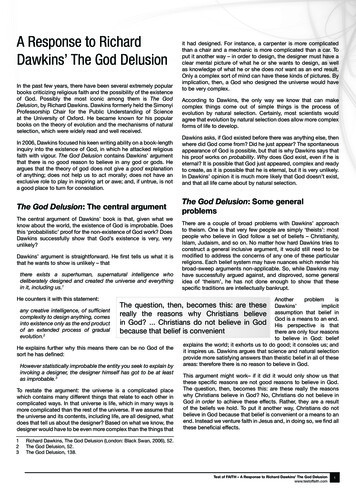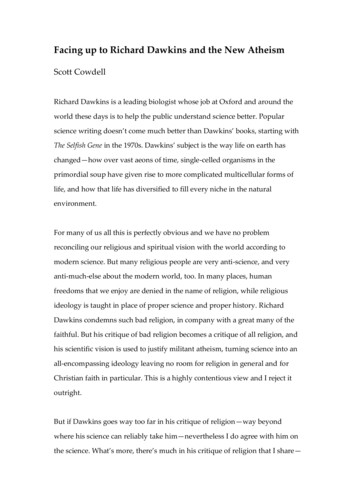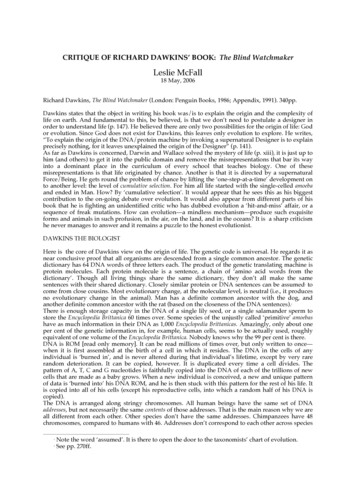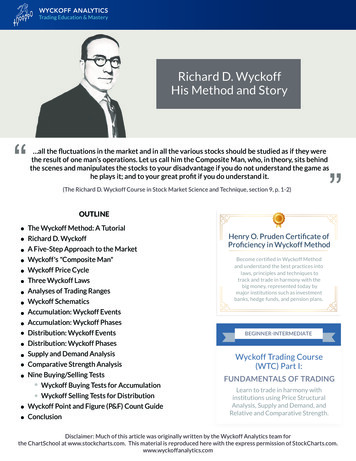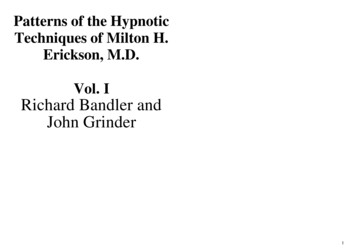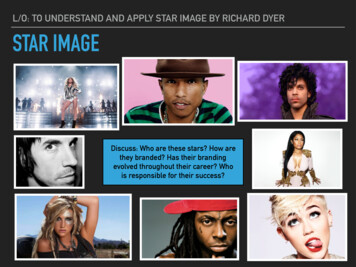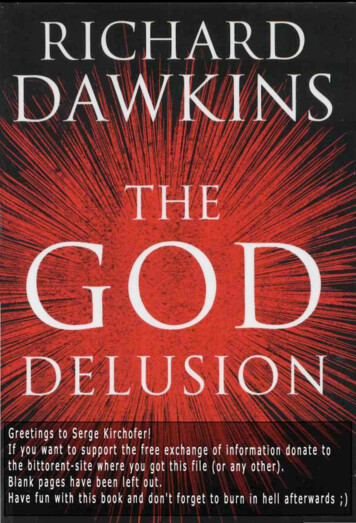
Transcription
Also by Richard DawkinsThe Selfish GeneThe Extended PhenotypeThe Blind WatchmakerRiver Out of EdenClimbing Mount ImprobableUnweaving the RainbowA Devil's ChaplainThe Ancestor's Tale
THE GOD DELUSIONRichard Dawkins
TRANSWORLD PUBLISHERS61-63 Uxbridge Road, London W5 5SAa division of The Random House Group LtdRANDOM HOUSE AUSTRALIA (PTY) LTD20 Alfred Street, Milsons Point, Sydney,New South Wales 2061, AustraliaRANDOM HOUSE NEW ZEALAND LTD18 Poland Road, Glenfield, Auckland 10, New ZealandRANDOM HOUSE SOUTH AFRICA (PTY) LTDIsle of Houghton, Corner of Boundary Road &c Carse O'Gowrie,Houghton 2198, South AfricaRANDOM HOUSE PUBLISHERS INDIA PRIVATE LIMITED301 World Trade Tower, Hotel Intercontinental Grand Complex,Barakhamba Lane, New Delhi 110 001, IndiaPublished 2006 by Bantam Pressa division of Transworld PublishersCopyright Richard Dawkins 2006The right of Richard Dawkins to be identifiedas the author of this work has been asserted in accordancewith sections 77 and 78 of the Copyright, Designs andPatents Act 1988.A catalogue record for this book is availablefrom the British Library.ISBN 9780593055489 (from Jan 07)ISBN 0593055489ISBN 9780593058251 (tpb from Jan 07)ISBN 0593058259 (tpb)All rights reserved. No part of this publication maybe reproduced, stored in a retrieval system, ortransmitted in any form or by any means,electronic, mechanical, photocopying, recording,or otherwise, without the prior permission ofthe publishers.Typeset in ll/14pt Sabon byFalcon Oast Graphic Art Ltd.Printed and bound in Great Britain byWilliam Clowes Ltd, Beccles, Suffolk5791134Papers used by Transworld Publishers are natural, recyclable productsmade from wood grown in sustainable forests. The manufacturing processes conform tothe environmental regulations of the country of origin.
In MemoriamDouglas Adams (1952-2001)'Isn't it enough to see that a garden is beautiful without having tobelieve that there are fairies at the bottom of it too?'
ContentsPrefaceChapter 1Chapter 2A deeply religious non-believer9Deserved respect11Undeserved respect20The God Hypothesis29Polytheism32Monotheism37Secularism, the Founding Fathersand the religion of America38The poverty of agnosticism46NOMA54The Great Prayer Experiment61The Neville Chamberlain schoolof evolutionistsLittle green menChapter 36669Arguments for God's existence75Thomas Aquinas' 'proofs'77The ontological argument and othera priori argumentsThe argument from beauty8086The argument from personal'experience'87
The argument from scripture92The argument from admiredreligious scientistsChapter 497Pascal's Wager103Bayesian arguments105Why there almost certainly isno God111The Ultimate Boeing 747113Natural selection as aconsciousness-raiser114Irreducible complexity119The worship of gaps125The anthropic principle: planetaryversion134The anthropic principle: cosmologicalversionAn interlude at CambridgeChapter 5The roots of religion141151161The Darwinian imperative163Direct advantages of religion166Group selection169Religion as a by-product ofsomething else172Psychologically primed forreligion179
Tread softly, because you tread onmy memesCargo cultsChapter 6The roots of morality: why arewe good?191202209Does our moral sense have aDarwinian origin?214A case study in the roots ofmoralityIf there is no God, why be good?Chapter 7222226The 'Good' Book and the changingmoral Zeitgeist235The Old Testament237Is the New Testament any better?250Love thy neighbour254The moral Zeitgeist262What about Hitler and Stalin?Weren't they atheists?Chapter 8What's wrong with religion?Why be so hostile?272279Fundamentalism and the subversionof science282The dark side of absolutism286Faith and homosexuality289
Faith and the sanctity of humanlifeThe Great Beethoven Fallacy291298How 'moderation' in faith fostersfanaticismChapter 9301Childhood, abuse and the escapefrom religion309Physical and mental abuse315In defence of children325An educational scandal331Consciousness-raising again337Religious education as a part ofliterary cultureChapter 10A much needed gap?340345Binker347Consolation352Inspiration360The mother of all burkas362Appendix: a partial list of friendly addresses, forindividuals needing support in escapingfrom religion375Books cited or recommended380Notes388Index400
PrefaceAs a child, my wife hated her school and wished she could leave.Years later, when she was in her twenties, she disclosed thisunhappy fact to her parents, and her mother was aghast: 'Butdarling, why didn't you come to us and tell us?' Lalla's reply is mytext for today: 'But I didn't know I could.'I didn't know I could.I suspect - well, I am sure - that there are lots of people out therewho have been brought up in some religion or other, are unhappyin it, don't believe it, or are worried about the evils that are done inits name; people who feel vague yearnings to leave their parents'religion and wish they could, but just don't realize that leaving is anoption. If you are one of them, this book is for you. It is intendedto raise consciousness - raise consciousness to the fact that to be anatheist is a realistic aspiration, and a brave and splendid one. Youcan be an atheist who is happy, balanced, moral, and intellectuallyfulfilled. That is the first of my consciousness-raising messages. Ialso want to raise consciousness in three other ways, which I'llcome on to.In January 2006 I presented a two-part television documentary onBritish television (Channel Four) called Root of All Evil? From thestart, I didn't like the title. Religion is not the root of all evil, forno one thing is the root of all anything. But I was delighted with theadvertisement that Channel Four put in the national newspapers.It was a picture of the Manhattan skyline with the caption 'Imaginea world without religion.' What was the connection? The twintowers of the World Trade Center were conspicuously present.Imagine, with John Lennon, a world with no religion. Imagineno suicide bombers, no 9/11, no 7/7, no Crusades, no witch-hunts,no Gunpowder Plot, no Indian partition, no Israeli/Palestinianwars, no Serb/Croat/Muslim massacres, no persecution of Jewsas 'Christ-killers', no Northern Ireland 'troubles', no 'honourkillings', no shiny-suited bouffant-haired televangelists fleecinggullible people of their money ('God wants you to give till ithurts'). Imagine no Taliban to blow up ancient statues, no public
2T 11 E G O DDELU SIONbeheadings of blasphemers, no flogging of female skin for the crimeof showing an inch of it. Incidentally, my colleague DesmondMorris informs me that John Lennon's magnificent song is sometimes performed in America with the phrase 'and no religion too'expurgated. One version even has the effrontery to change it to 'andone religion too'.Perhaps you feel that agnosticism is a reasonable position, butthat atheism is just as dogmatic as religious belief? If so, I hopeChapter 2 will change your mind, by persuading you that 'the GodHypothesis' is a scientific hypothesis about the universe, whichshould be analysed as sceptically as any other. Perhaps you havebeen taught that philosophers and theologians have put forwardgood reasons to believe in God. If you think that, you might enjoyChapter 3 on 'Arguments for God's existence' - the arguments turnout to be spectacularly weak. Maybe you think it is obvious thatGod must exist, for how else could the world have come into being?How else could there be life, in all its rich diversity, with everyspecies looking uncannily as though it had been 'designed'? If yourthoughts run along those lines, I hope you will gain enlightenmentfrom Chapter 4 on 'Why there almost certainly is no God'.Far from pointing to a designer, the illusion of design in the livingworld is explained with far greater economy and with devastatingelegance by Darwinian natural selection. And, while natural selectionitself is limited to explaining the living world, it raises our consciousness to the likelihood of comparable explanatory 'cranes' that mayaid our understanding of the cosmos itself. The power of cranes suchas natural selection is the second of my four consciousness-raisers.Perhaps you think there must be a god or gods because anthropologists and historians report that believers dominate everyhuman culture. If you find that convincing, please refer to Chapter5, on 'The roots of religion', which explains why belief is soubiquitous. Or do you think that religious belief is necessary inorder for us to have justifiable morals? Don't we need God, in orderto be good? Please read Chapters 6 and 7 to see why this is not so.Do you still have a soft spot for religion as a good thing for theworld, even if you yourself have lost your faith? Chapter 8 willinvite you to think about ways in which religion is not such a goodthing for the world.
PREFACE3If you feel trapped in the religion of your upbringing, it wouldbe worth asking yourself how this came about. The answer isusually some form of childhood indoctrination. If you are religiousat all it is overwhelmingly probable that your religion is that ofyour parents. If you were born in Arkansas and you thinkChristianity is true and Islam false, knowing full well that youwould think the opposite if you had been born in Afghanistan,you are the victim of childhood indoctrination. Mutatis mutandisif you were born in Afghanistan.The whole matter of religion and childhood is the subject ofChapter 9, which also includes my third consciousness-raiser. Justas feminists wince when they hear 'he' rather than 'he or she', or'man' rather than 'human', I want everybody to flinch whenever wehear a phrase such as 'Catholic child' or 'Muslim child'. Speak of a'child of Catholic parents' if you like; but if you hear anybodyspeak of a 'Catholic child', stop them and politely point out thatchildren are too young to know where they stand on such issues,just as they are too young to know where they stand on economicsor politics. Precisely because my purpose is consciousness-raising,I shall not apologize for mentioning it here in the Preface as wellas in Chapter 9. You can't say it too often. I'll say it again. Thatis not a Muslim child, but a child of Muslim parents. That child istoo young to know whether it is a Muslim or not. There is nosuch thing as a Muslim child. There is no such thing as a Christianchild.Chapters 1 and 10 top and tail the book by explaining, in theirdifferent ways, how a proper understanding of the magnificence ofthe real world, while never becoming a religion, can fill theinspirational role that religion has historically - and inadequately usurped.My fourth consciousness-raiser is atheist pride. Being an atheistis nothing to be apologetic about. On the contrary, it is somethingto be proud of, standing tall to face the far horizon, for atheismnearly always indicates a healthy independence of mind and,indeed, a healthy mind. There are many people who know, in theirheart of hearts, that they are atheists, but dare not admit it totheir families or even, in some cases, to themselves. Partly, this isbecause the very word 'atheist' has been assiduously built up as a
4TH EGODDELUSIONterrible and frightening label. Chapter 9 quotes the comedian JuliaSweeney's tragi-comic story of her parents' discovery, throughreading a newspaper, that she had become an atheist. Not believingin God they could just about take, but an atheist! An ATHEIST}(The mother's voice rose to a scream.)I need to say something to American readers in particular at thispoint, for the religiosity of today's America is something trulyremarkable. The lawyer Wendy Kaminer was exaggerating onlyslightly when she remarked that making fun of religion is as riskyas burning a flag in an American Legion Hall.1 The status ofatheists in America today is on a par with that of homosexuals fiftyyears ago. Now, after the Gay Pride movement, it is possible,though still not very easy, for a homosexual to be elected to publicoffice. A Gallup poll taken in 1999 asked Americans whether theywould vote for an otherwise well-qualified person who was a woman(95 per cent would), Roman Catholic (94 per cent would), Jew (92 percent), black (92 per cent), Mormon (79 per cent), homosexual (79per cent) or atheist (49 per cent). Clearly we have a long way to go.But atheists are a lot more numerous, especially among the educatedelite, than many realize. This was so even in the nineteenth century,when John Stuart Mill was already able to say: 'The world would beastonished if it knew how great a proportion of its brightestornaments, of those most distinguished even in popular estimation forwisdom and virtue, are complete sceptics in religion.'This must be even truer today and, indeed, I present evidence forit in Chapter 3. The reason so many people don't notice atheists isthat many of us are reluctant to 'come out'. My dream is that thisbook may help people to come out. Exactly as in the case of the gaymovement, the more people come out, the easier it will be for othersto join them. There may be a critical mass for the initiation of achain reaction.American polls suggest that atheists and agnostics far outnumber religious Jews, and even outnumber most other particularreligious groups. Unlike Jews, however, who are notoriously one ofthe most effective political lobbies in the United States, and unlikeevangelical Christians, who wield even greater political power,atheists and agnostics are not organized and therefore exert almostzero influence. Indeed, organizing atheists has been compared to
PREFACE5herding cats, because they tend to think independently and will notconform to authority. But a good first step would be to build up acritical mass of those willing to 'come out', thereby encouragingothers to do so. Even if they can't be herded, cats in sufficientnumbers can make a lot of noise and they cannot be ignored.The word 'delusion' in my title has disquieted some psychiatristswho regard it as a technical term, not to be bandied about. Threeof them wrote to me to propose a special technical term forreligious delusion: 'relusion'.2 Maybe it'll catch on. But for now Iam going to stick with 'delusion', and I need to justify my use of it.The Penguin English Dictionary defines a delusion as 'a false beliefor impression'. Surprisingly, the illustrative quotation the dictionary gives is from Phillip E. Johnson: 'Darwinism is the story ofhumanity's liberation from the delusion that its destiny is controlledby a power higher than itself.' Can that be the same Phillip E.Johnson who leads the creationist charge against Darwinism inAmerica today? Indeed it is, and the quotation is, as we mightguess, taken out of context. I hope the fact that I have stated asmuch will be noted, since the same courtesy has not been extendedto me in numerous creationist quotations of my works, deliberatelyand misleadingly taken out of context. Whatever Johnson's ownmeaning, his sentence as it stands is one that I would be happy toendorse. The dictionary supplied with Microsoft Word defines adelusion as 'a persistent false belief held in the face of strongcontradictory evidence, especially as a symptom of psychiatric disorder'. The first part captures religious faith perfectly. As towhether it is a symptom of a psychiatric disorder, I am inclined tofollow Robert M. Pirsig, author of Zen and the Art of MotorcycleMaintenance, when he said, 'When one person suffers from adelusion, it is called insanity. When many people suffer froma delusion it is called Religion.'If this book works as I intend, religious readers who open it willbe atheists when they put it down. What presumptuous optimism!Of course, dyed-in-the-wool faith-heads are immune to argument,their resistance built up over years of childhood indoctrinationusing methods that took centuries to mature (whether by evolutionor design). Among the more effective immunological devices is adire warning to avoid even opening a book like this, which is surely
6T H EGODDELUSIONa work of Satan. But I believe there are plenty of open-mindedpeople out there: people whose childhood indoctrination was nottoo insidious, or for other reasons didn't 'take', or whose nativeintelligence is strong enough to overcome it. Such free spirits shouldneed only a little encouragement to break free of the vice of religionaltogether. At very least, I hope that nobody who reads this bookwill be able to say, 'I didn't know I could.'For help in the preparation of this book, I am grateful to manyfriends and colleagues. I cannot mention them all, but they includemy literary agent John Brockman, and my editors, Sally Gaminara(for Transworld) and Eamon Dolan (for Houghton Mifflin), bothof whom read the book with sensitivity and intelligent understanding, and gave me a helpful mixture of criticism and advice. Theirwhole-hearted and enthusiastic belief in the book was very encouraging to me. Gillian Somerscales has been an exemplary copyeditor, as constructive with her suggestions as she was meticulouswith her corrections. Others who criticized various drafts, and towhom I am very grateful, are Jerry Coyne, J. Anderson Thomson,R. Elisabeth Cornwell, Ursula Goodenough, Latha Menon andespecially Karen Owens, critic extraordinaire, whose acquaintancewith the stitching and unstitching of every draft of the book hasbeen almost as detailed as my own.The book owes something (and vice versa) to the two-parttelevision documentary Root of All Evil?, which I presented onBritish television (Channel Four) in January 2006. I am grateful toall who were involved in the production, including Deborah Kidd,Russell Barnes, Tim Cragg, Adam Prescod, Alan Clements andHamish Mykura. For permission to use quotations from the documentary I thank IWC Media and Channel Four. Root of All Evil?achieved excellent ratings in Britain, and it has also been taken bythe Australian Broadcasting Corporation. It remains to be seenwhether any US television channel will dare to show it. *This book has been developing in my mind for some years.During that time, some of the ideas inevitably found their way intolectures, for example my Tanner Lectures at Harvard, and articlesin newspapers and magazines. Readers of my regular column in*Bootleg copies are being downloaded from numerous US websites.Negotiations are under way for legitimate DVDs to be marketed. At the time ofgoing to press these negotiations are incomplete - updates will be posted atwww.richarddawkins.net.
PREFACE7Free Inquiry, especially, may find certain passages familiar. I amgrateful to Tom Flynn, the Editor of that admirable magazine, forthe stimulus he gave me when he commissioned me to become aregular columnist. After a temporary hiatus during the finishing ofthe book, I hope now to resume my column, and will no doubt useit to respond to the aftermath of the book.For a variety of reasons I am grateful to Dan Dennett, MarcHauser, Michael Stirrat, Sam Harris, Helen Fisher, MargaretDowney, Ibn Warraq, Hermione Lee, Julia Sweeney, Dan Barker,Josephine Welsh, Ian Baird and especially George Scales.Nowadays, a book such as this is not complete until it becomes thenucleus of a living website, a forum for supplementary materials,reactions, discussions, questions and answers - who knows whatthe future may bring? I hope that www.richarddawkins.net/, thewebsite of the Richard Dawkins Foundation for Reason andScience, will come to fill that role, and I am extremely grateful toJosh Timonen for the artistry, professionalism and sheer hard workthat he is putting into it.Above all, I thank my wife Lalla Ward, who has coaxed methrough all my hesitations and self-doubts, not just with moralsupport and witty suggestions for improvement, but by reading theentire book aloud to me, at two different stages in its development,so I could apprehend very directly how it might seem to a readerother than myself. I recommend the technique to other authors, butI must warn that for best results the reader must be a professionalactor, with voice and ear sensitively tuned to the music of language.
CHAPTER 1A deeply religiousnon-believerI don't try to imagine a personal God; it suffices tostand in awe at the structure of the world, insofar as itallows our inadequate senses to appreciate it.ALBERT EINSTEIN
ADEEPLYRELIGIOUSN O N - B E L I E V E R11DESERVED RESPECTThe boy lay prone in the grass, his chin resting on his hands. Hesuddenly found himself overwhelmed by a heightened awareness ofthe tangled stems and roots, a forest in microcosm, a transfiguredworld of ants and beetles and even - though he wouldn't haveknown the details at the time - of soil bacteria by the billions,silently and invisibly shoring up the economy of the micro-world.Suddenly the micro-forest of the turf seemed to swell and becomeone with the universe, and with the rapt mind of the boy contemplating it. He interpreted the experience in religious terms and it ledhim eventually to the priesthood. He was ordained an Anglicanpriest and became a chaplain at my school, a teacher of whom I wasfond. It is thanks to decent liberal clergymen like him that nobodycould ever claim that I had religion forced down my throat. *In another time and place, that boy could have been me underthe stars, dazzled by Orion, Cassiopeia and Ursa Major, tearfulwith the unheard music of the Milky Way, heady with the nightscents of frangipani and trumpet flowers in an African garden. Whythe same emotion should have led my chaplain in one direction andme in the other is not an easy question to answer. A quasi-mysticalresponse to nature and the universe is common among scientistsand rationalists. It has no connection with supernatural belief. Inhis boyhood at least, my chaplain was presumably not aware (norwas I) of the closing lines of The Origin of Species - the famous'entangled bank' passage, 'with birds singing on the bushes, withvarious insects flitting about, and with worms crawling through thedamp earth'. Had he been, he would certainly have identified withit and, instead of the priesthood, might have been led to Darwin'sview that all was 'produced by laws acting around us':* Our sport during lessons was to sidetrack him away from scripture and towardsstirring tales of Fighter Command and the Few. He had done warservice in the RAF and it was with familiarity, and something of the affection thatI still retain for the Church of England (at least by comparison with the competition), that I later read John Betjeman's poem:Our padre is an old sky pilot,Severely now they've clipped his wings,But still the flagstaff in the Rect'ry gardenPoints to Higher Things . . .
12THEGODDELUSIONThus, from the war of nature, from famine and death, themost exalted object which we are capable of conceiving,namely, the production of the higher animals, directlyfollows. There is grandeur in this view of life, with itsseveral powers, having been originally breathed into a fewforms or into one; and that, whilst this planet has gonecycling on according to the fixed law of gravity, from sosimple a beginning endless forms most beautiful and mostwonderful have been, and are being, evolved.Carl Sagan, in Pale Blue Dot, wrote:How is it that hardly any major religion has looked atscience and concluded, 'This is better than we thought!The Universe is much bigger than our prophets said,grander, more subtle, more elegant'? Instead they say, 'No,no, no! My god is a little god, and I want him to stay thatway.' A religion, old or new, that stressed the magnificence of the Universe as revealed by modern science mightbe able to draw forth reserves of reverence and awe hardlytapped by the conventional faiths.All Sagan's books touch the nerve-endings of transcendent wonderthat religion monopolized in past centuries. My own books havethe same aspiration. Consequently I hear myself often described asa deeply religious man. An American student wrote to me that shehad asked her professor whether he had a view about me. 'Sure,' hereplied. 'He's positive science is incompatible with religion, buthe waxes ecstatic about nature and the universe. To me, that isreligion!' But is 'religion' the right word? I don't think so.The Nobel Prize-winning physicist (and atheist) Steven Weinbergmade the point as well as anybody, in Dreams of a FinalTheory:Some people have views of God that are so broad andflexible that it is inevitable that they will find Godwherever they look for him. One hears it said that 'God isthe ultimate' or 'God is our better nature' or 'God is the
ADEEPLYRELIGIOUSNON-BELIEVER13universe.' Of course, like any other word, the word 'God'can be given any meaning we like. If you want to say that'God is energy,' then you can find God in a lump ofcoal.Weinberg is surely right that, if the word God is not to becomecompletely useless, it should be used in the way people have generally understood it: to denote a supernatural creator that is'appropriate for us to worship'.Much unfortunate confusion is caused by failure to distinguishwhat can be called Einsteinian religion from supernatural religion.Einstein sometimes invoked the name of God (and he is not theonly atheistic scientist to do so), inviting misunderstanding bysupernaturalists eager to misunderstand and claim so illustrious athinker as their own. The dramatic (or was it mischievous?) endingof Stephen Hawking's A Brief History of Time, 'For then we shouldknow the mind of God', is notoriously misconstrued. It has ledpeople to believe, mistakenly of course, that Hawking is a religiousman. The cell biologist Ursula Goodenough, in The Sacred Depthsof Nature, sounds more religious than Hawking or Einstein. Sheloves churches, mosques and temples, and numerous passages inher book fairly beg to be taken out of context and used asammunition for supernatural religion. She goes so far as to call herself a 'Religious Naturalist'. Yet a careful reading of her bookshows that she is really as staunch an atheist as I am.'Naturalist' is an ambiguous word. For me it conjures my childhood hero, Hugh Lofting's Doctor Dolittle (who, by the way, hadmore than a touch of the 'philosopher' naturalist of HMS Beagleabout him). In the eighteenth and nineteenth centuries, naturalistmeant what it still means for most of us today: a student of thenatural world. Naturalists in this sense, from Gilbert White on,have often been clergymen. Darwin himself was destined for theChurch as a young man, hoping that the leisurely life of a countryparson would enable him to pursue his passion for beetles. Butphilosophers use 'naturalist' in a very different sense, as theopposite of supernaturalist. Julian Baggini explains in Atheism: AVery Short Introduction the meaning of an atheist's commitment tonaturalism: 'What most atheists do believe is that although there is
14THE G O DDELUSIONonly one kind of stuff in the universe and it is physical, out of thisstuff come minds, beauty, emotions, moral values - in short the fullgamut of phenomena that gives richness to human life.'Human thoughts and emotions emerge from exceedingly complex interconnections of physical entities within the brain. Anatheist in this sense of philosophical naturalist is somebody whobelieves there is nothing beyond the natural, physical world, nosupernatural creative intelligence lurking behind the observableuniverse, no soul that outlasts the body and no miracles - except inthe sense of natural phenomena that we don't yet understand. Ifthere is something that appears to lie beyond the natural world asit is now imperfectly understood, we hope eventually to understandit and embrace it within the natural. As ever when we unweave arainbow, it will not become less wonderful.Great scientists of our time who sound religious usually turn outnot to be so when you examine their beliefs more deeply. This iscertainly true of Einstein and Hawking. The present AstronomerRoyal and President of the Royal Society, Martin Rees, told me thathe goes to church as an 'unbelieving Anglican . . . out of loyalty tothe tribe'. He has no theistic beliefs, but shares the poeticnaturalism that the cosmos provokes in the other scientists I havementioned. In the course of a recently televised conversation, Ichallenged my friend the obstetrician Robert Winston, a respectedpillar of British Jewry, to admit that his Judaism was of exactly thischaracter and that he didn't really believe in anything supernatural.He came close to admitting it but shied at the last fence (to be fair,he was supposed to be interviewing me, not the other way around).3When I pressed him, he said he found that Judaism provided a gooddiscipline to help him structure his life and lead a good one.Perhaps it does; but that, of course, has not the smallest bearing onthe truth value of any of its supernatural claims. There are manyintellectual atheists who proudly call themselves Jews and observeJewish rites, perhaps out of loyalty to an ancient tradition or tomurdered relatives, but also because of a confused and confusingwillingness to label as 'religion' the pantheistic reverence whichmany of us share with its most distinguished exponent, AlbertEinstein. They may not believe but, to borrow Dan Dennett'sphrase, they 'believe in belief'.4
ADEEPLYRELIGIOUSN O N - B E L I E V E R15One of Einstein's most eagerly quoted remarks is 'Sciencewithout religion is lame, religion without science is blind.' ButEinstein also said,It was, of course, a lie what you read about my religiousconvictions, a lie which is being systematically repeated. Ido not believe in a personal God and I have never deniedthis but have expressed it clearly. If something is in mewhich can be called religious then it is the unboundedadmiration for the structure of the world so far as ourscience can reveal it.Does it seem that Einstein contradicted himself? That his wordscan be cherry-picked for quotes to support both sides of an argument? No. By 'religion' Einstein meant something entirely differentfrom what is conventionally mea
Also by Richard Dawkins T he Selfish G ene T he E xtended P henotype T he B lind W atchm aker R iver O ut of E den C lim bing M ount Im probable U nw eaving the R ainbow A D evil's C haplain T he A ncestor's T ale. T H E G
